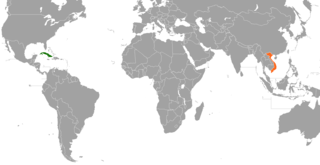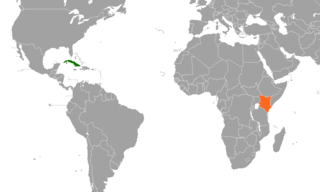
Cuba's foreign policy has been fluid throughout history depending on world events and other variables, including relations with the United States. Without massive Soviet subsidies and its primary trading partner, Cuba became increasingly isolated in the late 1980s and early 1990s after the fall of the USSR and the end of the Cold War, but Cuba opened up more with the rest of the world again starting in the late 1990s when they have since entered bilateral co-operation with several South American countries, most notably Venezuela and Bolivia beginning in the late 1990s, especially after the Venezuela election of Hugo Chávez in 1999, who became a staunch ally of Castro's Cuba. The United States used to stick to a policy of isolating Cuba until December 2014, when Barack Obama announced a new policy of diplomatic and economic engagement. The European Union accuses Cuba of "continuing flagrant violation of human rights and fundamental freedoms". Cuba has developed a growing relationship with the People's Republic of China and Russia. In all, Cuba continues to have formal relations with 160 nations, and provided civilian assistance workers – principally medical – in more than 20 nations. More than one million exiles have escaped to foreign countries. Cuba's present foreign minister is Bruno Rodríguez Parrilla.

Kiribati is a full member of the Commonwealth, the IMF and the World Bank, and became a full member of the United Nations in 1999. Kiribati hosted the Thirty-First Pacific Islands Forum in October 2000. Kiribati has Least Developed Country Status and its interests rarely extend beyond the region. Through accession to the Lomé Convention, then Cotonou Agreement, Kiribati is also a member of the African Caribbean and Pacific Group. Kiribati maintains good relations with most countries and has particularly close ties to Pacific neighbours Japan, Australia, and New Zealand. Kiribati briefly suspended its relations with France in 1995 over that country's decision to renew nuclear testing in the South Pacific.

Nauru, following independence from the United Kingdom, became a sovereign, independent republic on 31 January 1968. Nauru has established diplomatic relations with a number of nations, including most of its Pacific neighbors with which it maintains economic, cultural and administrative ties.

Relations between Cuba and Venezuela were established in 1902. The relationship deteriorated in the 1960s and Venezuela broke relations in late 1961 following the Betancourt Doctrine policy of not having ties with governments that had come to power by non-electoral means. A destabilizing factor was the Cuban support for the antigovernment guerrilla force that operates in remote rural areas. Venezuela broke off relations with Cuba after the Machurucuto invasion in 1967, when Cuban trained guerrillas landed in Venezuela seeking to recruit guerrillas and overthrow the government of Raúl Leoni. Relations were reestablished in 1974.

Oceania is, to the People's Republic of China and the Republic of China, a stage for continuous diplomatic competition. The PRC dictates that no state can have diplomatic relations with both the PRC and the ROC. As of 2019, ten states in Oceania have diplomatic relations with the PRC, and four have diplomatic relations with the ROC. These numbers fluctuate as Pacific Island nations re-evaluate their foreign policies, and occasionally shift diplomatic recognition between Beijing and Taipei. The issue of which "Chinese" government to recognize has become a central theme in the elections of numerous Pacific Island nations, and has led to several votes of no-confidence.

Cuba–Namibia relations refer to the current and historical relationship between Cuba and Namibia. Cuba politically, militarily and diplomatically supported the South West Africa People's Organization (SWAPO) during the Namibian War of Independence. Cuba provided military training for the People's Liberation Army of Namibia (PLAN), SWAPO's armed wing. As a result of this involvement Namibia usually supports Cuban policies on the international level, like in the case of the requested release of the Cuban Five.

Cuba–Pakistan relations refers to the bilateral relations between Cuba and Pakistan. Cuba has an embassy in Islamabad and Pakistan has an embassy in Havana. Relations between the countries strengthened after Cuba provided humanitarian assistance to the victims of the 2005 Kashmir earthquake.
Cuban-Pacific relations are diplomatic, economic, cultural and other relations between the Republic of Cuba and countries situated in Oceania. In the 2000s, Cuba has been strengthening its relations with Pacific nations, which have, for the most part, responded favourably to Cuban medical aid in particular. The first Cuba-Pacific Islands ministerial meeting was held in September 2008 in Havana, with government members from ten Pacific countries—Kiribati, Tuvalu, Nauru, Solomon Islands, Fiji, Tonga, Vanuatu, Samoa, the Federated States of Micronesia and Papua New Guinea—attending. The meeting was a consolidation rather than a starting point of Cuban-Pacific relations.

Relations between Solomon Islands and the Republic of Cuba have only a short history. The two countries moved to establish relations from the 2000s, and particularly from 2007, within the context of Cuba's growing interest in the Pacific Islands region. Like other countries in Oceania, Solomon Islands is a beneficiary of Cuban medical aid; bilateral relations between Havana and Honiara must be viewed within the scope of Cuba's regional policy in Oceania.

Relations between Vanuatu and Cuba began shortly after the former gained its independence from France and the United Kingdom in 1980, and began establishing its own foreign policy as a newly independent state. Vanuatu and Cuba established official diplomatic relations in 1983.

The Republic of Kiribati and the People's Republic of China (PRC) established diplomatic relations on June 25, 1980, and resumed on September 27, 2019. Between 2003 and 2019, The government of Kiribati recognized the Republic of China, and, in accordance with the "One China" policy, the People's Republic of China did not have diplomatic relations to the country.
After the 1959 Cuban Revolution, Cuba established a programme to send its medical personnel overseas, particularly to Latin America, Africa and Oceania, and to bring medical students and patients to Cuba for training and treatment respectively. In 2007, Cuba had 42,000 workers in international collaborations in 103 different countries, of whom more than 30,000 were health personnel, including at least 19,000 physicians. Cuba provides more medical personnel to the developing world than all the G8 countries combined, although this comparison does not take into account G8 development aid spent on developing world healthcare. The Cuban missions have had substantial positive local impacts on the populations served. It is widely believed that medical workers are a vital export commodity for Cuba. According to Granma, the Cuban state newspaper, the number of Cuban medical staff abroad fell from 50,000 in 2015 to 28,000 in 2020.

Relations between Tuvalu and the Republic of Cuba are recent, having developed in the 2000s (decade). Like other countries in Oceania, Tuvalu is a beneficiary of Cuban medical aid; bilateral relations between Funafuti and Havana must be viewed within the scope of Cuba's regional policy in Oceania.

Cuba–India relations refers to the bilateral ties between the Republic of Cuba and the Republic of India.

Cuban–Vietnam relations are the interstate and special relations between the Republic of Cuba and the Socialist Republic of Vietnam. The relations are based on trade, credits, and investments which have increased significantly since the 1990s and on shared ideological beliefs – they are both socialist states. Diplomatic relations between the two countries were established in December 1960. Since then, Vietnam has become Cuba's second-largest trading partner in Asia, with Vietnam trailing behind China.

Cuba and Indonesia established diplomatic relations in 1960. During the administration of Indonesia's first president Sukarno in the 1960s, Indonesia and Cuba enjoyed an exceptionally close relationship. The relations between the two nations mostly focused on sports and health. Cuba has an embassy in Jakarta, while Indonesia has an embassy in Havana that is also accredited to the Commonwealth of the Bahamas and Jamaica. Both nations are full members of the Non-Aligned Movement and partners in the Group of 77 and the Forum of East Asia-Latin America Cooperation.

India and Kiribati established diplomatic relations in 1985. The High Commission of India in Suva, Fiji is concurrently accredited to Kiribati. Kiribati maintains an Honorary Consulate in New Delhi.

Cuba–Kenya relations are bilateral relations between Cuba and Kenya.

Georgia and the Republic of Kiribati established diplomatic relations in 2012.

Kiribati-Taiwan relations refers to relations between Kiribati and Taiwan. Kiribati, under the government of President Taneti Mamau, initially recognised the ROC but switched to PRC later on.



















